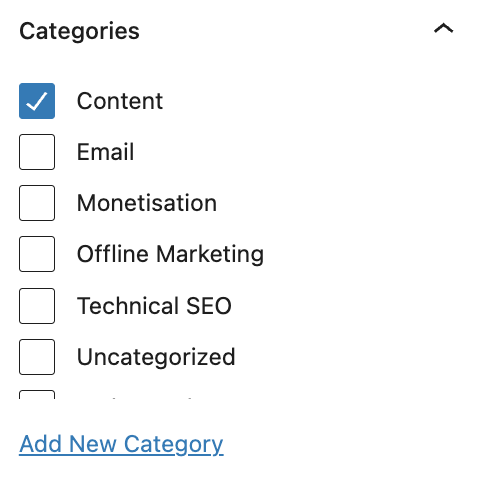In this post we will discuss if having many categories affects SEO, positively or negatively.
A while ago I was a firm believer of the thought that having many categories actually would benefit my sites, but nowadays I think that it depends on the type of site and in many cases is actually detrimental.
In this article I will explain in which ways it can benefitial and also how it can be negative.
When building this website, Purrfect Marketing Strategies, I decided to focus on just six core categories:
- web development
- content
- technical SEO
- offline marketing
- monetization
This streamlined approach allows for a more focused and cohesive content strategy, making it easier for visitors to navigate and find relevant information quickly. By limiting the number of categories, I ensure that each area receives the attention and depth it deserves, establishing a strong foundation of expertise in these essential aspects of digital marketing and online business.
In contrast, for other of my niche sites, I opted for a more granular structure with a few main categories and dozens of subcategories. This decision was driven by the need to cater to very specific interests and queries within a highly specialised field.
By drilling down into subcategories, I can provide in-depth, targeted content that addresses the unique needs and questions of a niche audience. This detailed approach helps in building authority and trust within the niche, ensuring that visitors can find highly relevant and specialised information that speaks directly to their concerns and interests.
Keep on reading to learn more!
How having multiple categories that are very niche in a website’s topic can positively impact your SEO?
Having multiple categories that are very niche in a website’s topic can positively impact your SEO in several ways:
Multiple categories help targeted keyword optimisation:
When you have niche categories, you can create specific content targeting long-tail keywords related to those categories. Long-tail keywords are more specific and less competitive, allowing you to rank higher in search results. By targeting these keywords within your niche categories, you increase the chances of attracting highly relevant organic traffic.
Multiple categories help enhanced relevance and user experience:
Niche categories allow you to organise your content in a more structured and focused manner. This improves the overall relevance of your website to specific topics, making it easier for search engines to understand and categorise your content accurately. It also helps users navigate your website and find the information they are looking for more efficiently, leading to a better user experience.
Multiple categories help improved internal linking and site architecture:
With niche categories, you can create a well-defined internal linking structure within your website. Internal linking helps search engines discover and crawl your content more effectively, and it also helps distribute link equity throughout your site. By interlinking relevant articles and pages within the same niche category, you can strengthen the topical authority of your content and improve its visibility in search results.
Check this article if you would like to learn how to add internal links without plugins.
Multiple categories help to build authority and expertise:
Focusing on niche categories allows you to establish yourself as an authority and expert in those specific areas. By consistently creating high-quality content within these niches, you build trust with your audience and search engines. This can lead to higher rankings, increased organic traffic, and potentially more backlinks from other websites looking for expert information in those niches.
Multiple categories help reduce competition:
Niche categories often have less competition compared to broader topics. This means you have a better chance of ranking higher in search results for those specific keywords and attracting targeted traffic. With less competition, it becomes relatively easier to establish your website as a go-to resource within those niches.
It’s important to note that while niche categories can have positive SEO impacts, it’s crucial to maintain a balance. Creating too many narrow categories or spreading your content too thin across multiple niches might dilute your website’s overall authority and make it challenging to build substantial traffic in each category. Focus on relevant, high-quality content within each niche, and ensure a coherent and user-friendly site structure to maximise the benefits of niche categories for your SEO efforts.
How having multiple categories that are very niche in a website’s topic can negatively impact your SEO?
Nowadays, I think that having too many categories in WordPress can affect SEO negatively for a few reasons.
While having multiple categories that are very niche in a website’s topic can have positive impacts on SEO, there are also potential negative effects to consider:
Limited search volume:
Niche categories often have a smaller search volume compared to broader topics. This means that the potential pool of organic traffic for each niche category may be limited. If you have too many niche categories with low search volume, it can hinder your overall website traffic and make it difficult to attract a substantial audience.
Thin content and keyword cannibalisation:
Creating multiple niche categories requires generating enough relevant content to populate each category. If you don’t have enough unique and valuable content for each category, it may result in thin content pages. Thin content can harm your SEO efforts as search engines prefer in-depth and comprehensive content. Additionally, if you target similar keywords across multiple niche categories, it can lead to keyword cannibalization, where different pages on your site compete against each other for the same keywords, diluting your SEO efforts.
If a post is attributed to more than one category you will create different URLs for the same page. This means that these pages will be duplicate content to the eyes of Google. Google will choose one of them as the canonical but it might not be the one that you want.
Difficulties in content organisation:
Managing numerous niche categories can complicate the organisation and structure of your website. If the categories become excessive or unclear, it may confuse both users and search engines. A cluttered or disorganised site structure can lead to poor user experience, making it harder for visitors to navigate and find the content they need. It can also make it challenging for search engines to understand the hierarchy and relevance of your content, affecting your rankings.
Diluted authority and backlinks:
With multiple niche categories, your website’s authority and backlinks may be spread thin across various topics. Building authority and acquiring quality backlinks can become more challenging when your content and expertise are divided into numerous niches. Having a focused approach and consolidating your efforts on fewer categories may allow you to build stronger authority and attract more backlinks within those specific areas.
Difficulty in maintaining and updating content:
Creating and maintaining content for multiple niche categories requires significant time and effort. It can be overwhelming to consistently produce high-quality content across various niches while keeping up with updates and ensuring each category receives adequate attention. If your content becomes outdated or neglected in certain niche categories, it can negatively impact user experience and search engine rankings.
Too many categories causing issues with plugins:
Having different URLs for one same post can create redirection issues. Also, this circles back to the issue with thin content.
An example would be:
- https://example.com/category1/how-to-write-an-article
- https://example.com/category2/how-to-write-an-article
Also, if you are using translation plugins, you might lose the categories associated with the original post when you translate a new page. If you lose one category it means that the URL is broken and you will create a 404 or a 301 (too many redirects).
I have this issue with the plugin Polylang and the solution is to always re-attribute the categories to the original post when I update the English.
If you already attributed more than one category to blog posts, leave just one by removing the other categories from the blog post (leave just one) and Google will forget the duplicates.

Multiple categories in WordPress has led me to different issues in Google Search Console:
- Page is not indexed: Page with redirect
- Alternative page with proper canonical tag
In the article Common Indexing issues and how to solve them we dive into the different crawling and indexing issues and how to solve them.
I hope this post helped you assess if having many categories in WordPress will affect positively or negatively your SEO efforts.
To optimise your website’s SEO with categories in WordPress, consider the following best practices:
- Keep your category structure organised and focused.
- Use relevant and targeted keywords for category names and descriptions.
- Assign posts or articles to relevant categories, avoiding duplication.
- Ensure each category has a sufficient number of posts or articles to provide value to users.
- Improve navigation and user experience by using menus, breadcrumbs, and internal linking.
- Optimise individual posts or articles within each category for specific keywords.
By maintaining a well-structured and focused category system, you can enhance your website’s SEO and improve its visibility in search engine results.
As you have seen, in order to mitigate these potential negative impacts, it’s important to strike a balance between having niche categories and maintaining a manageable and coherent website structure.
Conduct thorough keyword research to ensure sufficient search volume and demand for each niche category. Focus on creating comprehensive and valuable content within each niche, consolidating similar topics when necessary, and optimising your site structure for ease of navigation.
By carefully managing your categories, you can mitigate potential negative SEO effects and maximise the benefits of targeting specific topics.
If you are creating content for your site and want to find the best strategies and tactics for your SEO goals, check out these posts:
What is programmatic SEO and how to use it to boost your marketing efforts.
How to use Chat GTP to write marketing content and AI prompt examples.
How to Create a Content Marketing Strategy
How to do SEO and Content for B2B vs B2C Selling Propositions: A Comprehensive Guide.
Stay whisker-tuned for my next purr-fect marketing update!
Missing me already, dear human? You can find me on X and Facebook.
Moxie

